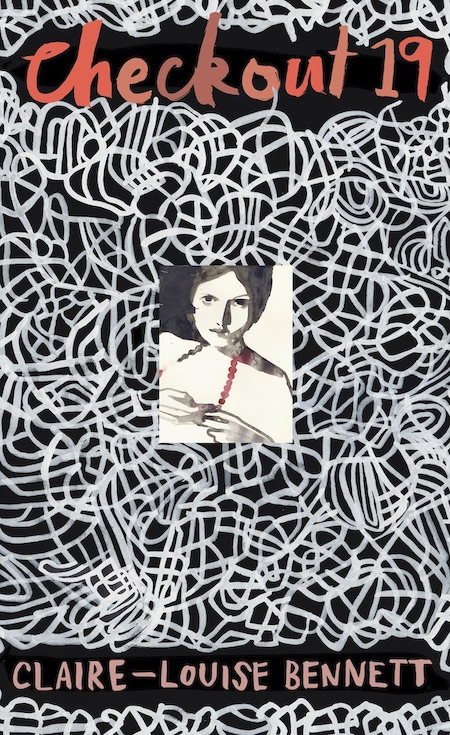Claire-Louise Bennett: Checkout 19 review - coming to life | reviews, news & interviews
Claire-Louise Bennett: Checkout 19 review - coming to life
Claire-Louise Bennett: Checkout 19 review - coming to life
A genre-bending novel about reading, living, writing and returning

Like any good writer, Claire-Louise Bennett loves lists. Lists are, after all, those moments when words, freed from grammar’s grip, can simply be themselves – do their own thing, show off, let loose.
Bennett mentions these and elsewhere, more exotic items of food and clothing, not only for the joy of the sounds and shapes they make, but also for the little short, sharp pangs of desire they induce, the little fires they set off in some deep pocket of the brain. Another reason to love lists: because they illuminate a way of thinking. “No ideas but in things”, runs poet Williams Carlos Williams’ maxim; it's one which Bennett relays and displays in this book, which is filled to the brim with love and gratitude for the most illuminating things of all: books.
Books, the reading of them and the burgeoning desire to write them, is the thread running through this eclectic, engrossing and frequently funny coming-of-age – or, as Bennett would have it, coming-to-life – story, holding it all together like the wire lattice of a trolley.
Despite the book’s title, we don’t in fact spend much time at all at checkout 19 – the supermarket till our memoirist (who may or may not be identical to Bennett herself) works at while doing her A-Levels. But somehow, we stay there in its world of assorted goods, looping round the shop’s aisles like the eccentric Russian man who goes there and takes a particular interest in her, one day handing her a copy of Beyond Good and Evil (of all things!).
Much like her appetite for books, Checkout 19 is voracious and seemingly unstoppable. Charting the course of one woman’s academic, social, family and love life, the book not only steams through first-, second- and third-person narration, and differents registers and genres; episodes and scenes and ideas also keep coming back as slightly richer, fuller versions of themselves. The impression is that Bennett really could go on and on – in the best way possible (though she stops herself at a modest 200 pages or so). At one point, we’re told literature students choose to “read in order to come to life”, but as Bennett knows and shows, that’s not the whole story. They read in order to come back to life – to have something to revisit, to unpack and repack.
 One of the book's most peculiar and entertaining characteristics – a feature which makes it more tempting to call it a novel – is Bennett’s retelling of some of her earlier material: stories with otherwise conventional characters who have since taken on lives of their own. The list above comes from the story of Tarquin Superbus, a dandy à la Wilde or perhaps Huysmans, nursing ennui and Weltschmerz in a palazzo in Venice (naturally). Another tale features a Cinderella-like figure who spends her days looming her evil sisters’ garments, only for her thread to end up unspooling and becoming the beginning of another tale – an apparent metaphor for the entanglement of Bennett’s (and/or her narrator’s) life with the written word. A trip to Florence is infused, for better or worse, with A Room with a View. Fiction keeps shading into personal and public history and vice versa. Even Tarquin’s ridiculous period fantasy is laced with hyperrealistic details and finally edged out altogether by ruminations on its resonances with real-world events.
One of the book's most peculiar and entertaining characteristics – a feature which makes it more tempting to call it a novel – is Bennett’s retelling of some of her earlier material: stories with otherwise conventional characters who have since taken on lives of their own. The list above comes from the story of Tarquin Superbus, a dandy à la Wilde or perhaps Huysmans, nursing ennui and Weltschmerz in a palazzo in Venice (naturally). Another tale features a Cinderella-like figure who spends her days looming her evil sisters’ garments, only for her thread to end up unspooling and becoming the beginning of another tale – an apparent metaphor for the entanglement of Bennett’s (and/or her narrator’s) life with the written word. A trip to Florence is infused, for better or worse, with A Room with a View. Fiction keeps shading into personal and public history and vice versa. Even Tarquin’s ridiculous period fantasy is laced with hyperrealistic details and finally edged out altogether by ruminations on its resonances with real-world events.
Also dispelling the rarefied aristocratic atmosphere, while adding some personal context for it, are Bennett’s later thoughts about being a woman writer with much less privileged origins. The North Star amid the constellations of books, names and influences is the still somewhat neglected Brighton-born Ann Quin, with whom Bennett almost certainly shares some DNA, not least a taste or instinct for “shuffling the distinction between objects and beings, self and other”.
Bennett writes passionately and movingly about how Quin’s legacy has been obscured not only by the contemporary reviews of fusty and ivory-towered men with “no grasp whatsoever of the lived experience of a working-class woman in the 1960s”, but also by the circumstances of her suicide off Brighton’s Palace Pier in 1973. The subject of women being defined, or rather subsumed, by death or damage or denial, often at the hands of men, keeps surfacing. It is almost as if the fluidity, fluency and in fact, fearlessness with which the book is written is an attempt to harness the life force of these woman: a refusal to let them be drowned out.
Bennett's pet metaphor, rather than water, is fire. The book is scorched by a Brontëan belief in the way women and words and works can rise from the ashes like Phoenixes. Each chapter is headed off by an epigraph (I almost wrote epitaph) from Ingeborg Bachmann, Annie Ernaux, Anais Nïn, Clarice Lispector – almost all of them writers who have been subject to cycles of neglect and rediscovery. But the point is that they keep coming back. Maybe this is why the book is named after the location of, by all accounts, a dull job. It’s all about transforming routine and finding joy in repetition. Checkout 19 is one of those books to go back to and over, one which may leave you saying “Again, again!".
- Checkout 19 by Claire-Louise Bennett (Jonathan Cape, £14.99)
- More book reviews on theartsdesk
The future of Arts Journalism
You can stop theartsdesk.com closing!
We urgently need financing to survive. Our fundraising drive has thus far raised £49,000 but we need to reach £100,000 or we will be forced to close. Please contribute here: https://gofund.me/c3f6033d
And if you can forward this information to anyone who might assist, we’d be grateful.

Subscribe to theartsdesk.com
Thank you for continuing to read our work on theartsdesk.com. For unlimited access to every article in its entirety, including our archive of more than 15,000 pieces, we're asking for £5 per month or £40 per year. We feel it's a very good deal, and hope you do too.
To take a subscription now simply click here.
And if you're looking for that extra gift for a friend or family member, why not treat them to a theartsdesk.com gift subscription?
more Books
 'We are bowled over!' Thank you for your messages of love and support
Much-appreciated words of commendation from readers and the cultural community
'We are bowled over!' Thank you for your messages of love and support
Much-appreciated words of commendation from readers and the cultural community
 Thomas Pynchon - Shadow Ticket review - pulp diction
Thomas Pynchon's latest (and possibly last) book is fun - for a while
Thomas Pynchon - Shadow Ticket review - pulp diction
Thomas Pynchon's latest (and possibly last) book is fun - for a while
 Justin Lewis: Into the Groove review - fun and fact-filled trip through Eighties pop
Month by month journey through a decade gives insights into ordinary people’s lives
Justin Lewis: Into the Groove review - fun and fact-filled trip through Eighties pop
Month by month journey through a decade gives insights into ordinary people’s lives
 Joanna Pocock: Greyhound review - on the road again
A writer retraces her steps to furrow a deeper path through modern America
Joanna Pocock: Greyhound review - on the road again
A writer retraces her steps to furrow a deeper path through modern America
 Mark Hussey: Mrs Dalloway - Biography of a Novel review - echoes across crises
On the centenary of the work's publication an insightful book shows its prescience
Mark Hussey: Mrs Dalloway - Biography of a Novel review - echoes across crises
On the centenary of the work's publication an insightful book shows its prescience
 Frances Wilson: Electric Spark - The Enigma of Muriel Spark review - the matter of fact
Frances Wilson employs her full artistic power to keep pace with Spark’s fantastic and fugitive life
Frances Wilson: Electric Spark - The Enigma of Muriel Spark review - the matter of fact
Frances Wilson employs her full artistic power to keep pace with Spark’s fantastic and fugitive life
 Elizabeth Alker: Everything We Do is Music review - Prokofiev goes pop
A compelling journey into a surprising musical kinship
Elizabeth Alker: Everything We Do is Music review - Prokofiev goes pop
A compelling journey into a surprising musical kinship
 Natalia Ginzburg: The City and the House review - a dying art
Dick Davis renders this analogue love-letter in polyphonic English
Natalia Ginzburg: The City and the House review - a dying art
Dick Davis renders this analogue love-letter in polyphonic English
 Tom Raworth: Cancer review - truthfulness
A 'lost' book reconfirms Raworth’s legacy as one of the great lyric poets
Tom Raworth: Cancer review - truthfulness
A 'lost' book reconfirms Raworth’s legacy as one of the great lyric poets
 Ian Leslie: John and Paul - A Love Story in Songs review - help!
Ian Leslie loses himself in amateur psychology, and fatally misreads The Beatles
Ian Leslie: John and Paul - A Love Story in Songs review - help!
Ian Leslie loses himself in amateur psychology, and fatally misreads The Beatles
 Samuel Arbesman: The Magic of Code review - the spark ages
A wide-eyed take on our digital world can’t quite dispel the dangers
Samuel Arbesman: The Magic of Code review - the spark ages
A wide-eyed take on our digital world can’t quite dispel the dangers
 Zsuzsanna Gahse: Mountainish review - seeking refuge
Notes on danger and dialogue in the shadow of the Swiss Alps
Zsuzsanna Gahse: Mountainish review - seeking refuge
Notes on danger and dialogue in the shadow of the Swiss Alps

Add comment